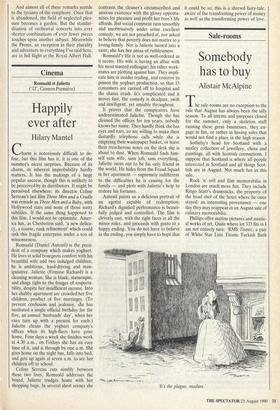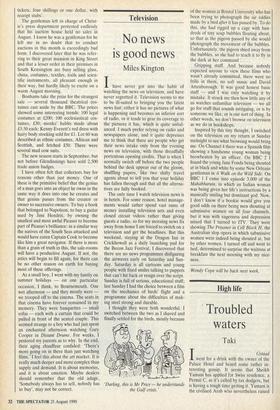Sale-rooms
Somebody has to buy
Alistair McAlpine
The sale-rooms are no exception to the rule that August has always been the silly season. To all intents and purposes closed for the summer, only a skeleton staff running these great businesses, they en- gage in fun, or rather in having sales that would not find a place in the high season.
Sotheby's head for Scotland with a motley collection of jewellery, china and paintings, all with Scottish connections. I suppose that Scotland is where all people interested in Scotland and all things Scot- tish are in August. Not much fun in this sale.
Rock 'n' roll and film memorabilia in London are much more fun. They include Ringo Starr's drumsticks, the property of the head chef of the hotel where he once stayed: an interesting provenance — one day they may reappear in an August sale of culinary memorabilia.
Phillips offer marine pictures and nautic- al works of art, Quite where lot 333 fits in I am not entirely sure: 'RMS Titanic, a pair of White Star Line Titanic Turkish Bath 'It's the plague, madam.' tickets, four shillings or one dollar, with receipt stubs'.
The gentleman left in charge of Christ- ie's press department protested endlessly that his auction house held no sales in August. I know he was a gentleman for he left me in no doubt that to conduct auctions in this month is exceedingly bad form. I discovered later that he was refer- ring to their great mansion in King Street and that a lesser order in their premises in South Kensington are busy selling glass, china, costumes, textiles, tools and scien- tific instruments, all pleasant enough in their way, but hardly likely to excite on a warm August morning.
Bonhams take the prize for the strangest sale — several thousand theatrical cos- tumes cast aside by the BBC. The prices showed some interesting trends: 100 legal costumes at £200; 100 ecclesiastical cos- tumes, £30; monks' habits made about £3.50 each; Kenny Everett's red dress with hairy body stocking sold for £1. Lot 60 was described as ethnic costumes, African and Scottish, and fetched £50. There were several mad cow suits.
The new season starts in September, but not before Glendinnings have sold 2,500 trade union badges.
I have often felt that collectors buy for reasons other than just money. One of these is the primitive belief that the genius of a man goes into an object he owns in the same way it does into one he creates and that genius passes from the creator or owner to successive owners. To buy a book that belonged to Napoleon, to buy a guitar used by Jimi Hendrix, by owning the smallest and most awful Picasso to become part of Picasso's brilliance: in a similar way the natives of the South Seas attacked and would have eaten Captain Cook to become like him a great navigator. If there is more than a grain of truth in this, the sale-rooms will have a productive August. If not, the attics will begin to fill again, for there can be no other reason on earth for buying most of these offerings.
As a small boy, I went with my family on summer holidays — on one particular occasion, I think, to Bournemouth. One wet afternoon — and they mostly were - we trooped off to the cinema. The seats in that cinema have forever remained in my memory. They were banquettes — small sofas — each with a curtain that could be pulled in front of the seated couple. This seemed strange to a boy who had just spent
an enchanted afternoon watching Gary Cooper in Distant Drums. For weeks, I
pestered my parents as to why. In the end, their aging chauffeur confided: 'There's more going on in there than just watching films.' I feel this about the art market. It is really much deeper and more complex than supply and demand. It is about memories, and it is about emotion. Maybe dealers should remember that the old adage, 'Somebody always has to sell, nobody has to buy', may not be correct.











































 Previous page
Previous page